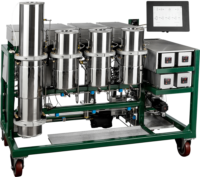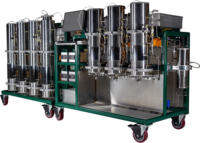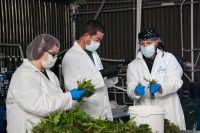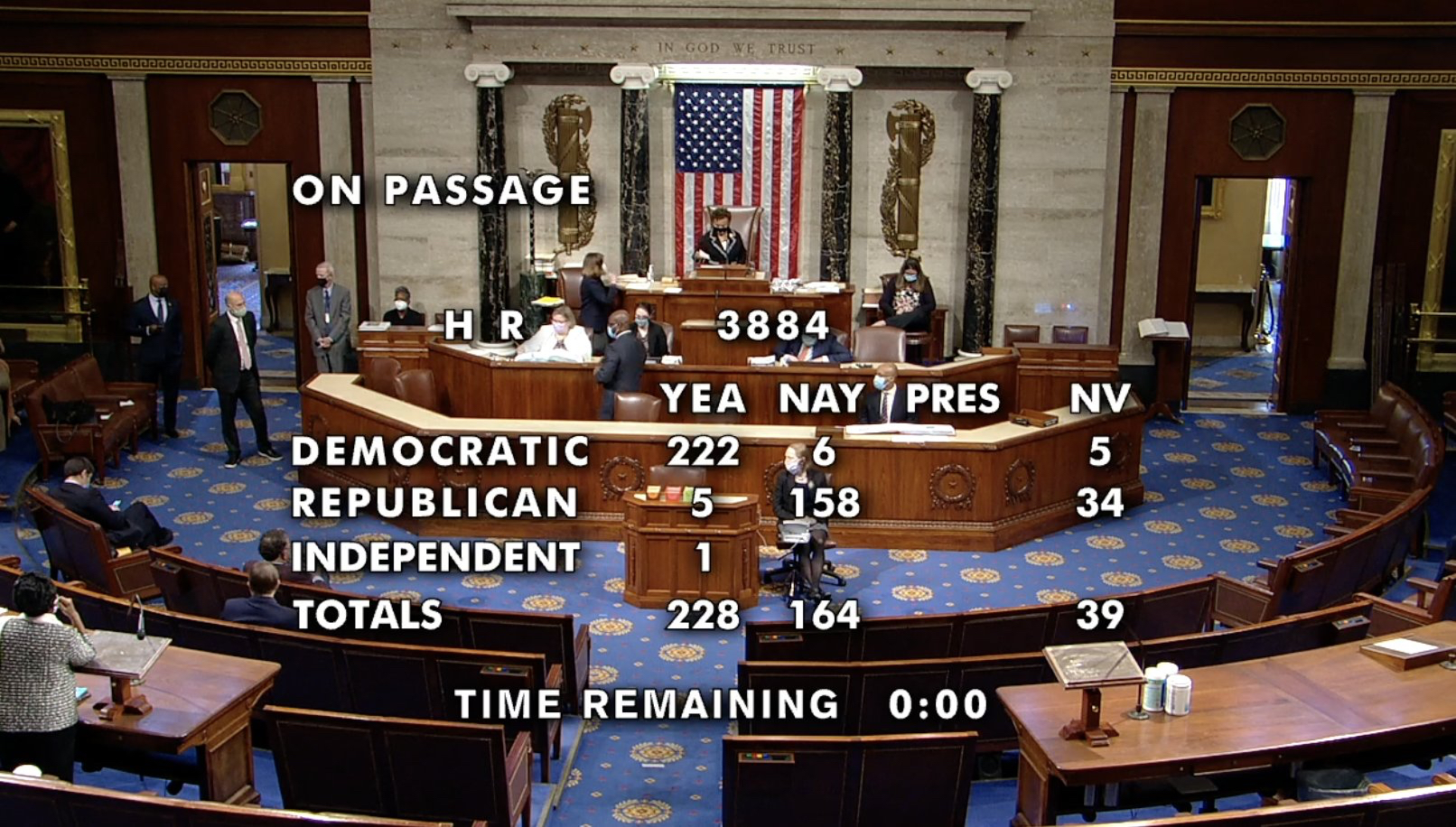While the mergers and acquisitions (M&A) space in the cannabis industry has significantly slowed in 2020, it certainly hasn’t stopped—not even during a pandemic.
According to S&P Global Market Intelligence, “a drop in company valuations complicated by the coronavirus-triggered capital squeeze” were the two major reasons for the slowdown. Still, S&P Global reports U.S. and Canadian cannabis and cannabis-related companies completed 124 deals in 2020, worth a combined $615.1 million—compared to 249 deals in 2019 and 324 deals in 2018.
We also learned this year, according to a Department of Justice (DOJ) whistleblower, that “U.S. Attorney General William Barr was motivated by his personal dislike of the cannabis industry when he launched multiple Antitrust Division merger investigations into nearly a dozen cannabis deals last year,” Cannabis Business Times reported in July. According to Eric Berlin, co-chair of Denton’s Cannabis Practice, “Many of the cannabis mergers under investigation did not get closed … due to these additional costs and time delays, and now, not only are the companies involved left with little to no recourse, but the DOJ’s actions have dramatically slowed the M&A activity in the industry.”
However, recovering valuations and renewed investor interest are expected to increase deals in 2021, according to the S&P Global. Not to mention, it was a monumental year for cannabis legalization in the U.S. And, cannabis businesses in most states and provinces were considered essential services. As we wait to see what 2021 deal-making brings, we’ve rounded up some of the most notable deals that closed, and those that fell through, in 2020.
1. Cresco Labs Acquires Origin House
Before the coronavirus pandemic, Cresco Labs officially closed its acquisition of Canada-based cannabis company Origin House. The deal was originally valued at C$1.1 billion, though the deal’s value ended up being lower amidst declining stocks and antitrust review delays. Perhaps the biggest cannabis transaction in the year, the move paved the way for Cresco Labs’ entry into the United States’ largest cannabis market: California.
“The acquisition of Origin House makes Cresco a leading wholesale distributor in California, selling into over 575 dispensaries, representing approximately 65% of California’s storefront dispensaries. Origin House’s Continuum distribution platform distributes 13 third-party brands, including Kings Garden,” according to a press release.
Cresco Labs’ brands are currently distributed in seven states, including Arizona, California, Illinois, Massachusetts, New York, Ohio and Pennsylvania.
2. Cresco Labs Terminates Tryke Companies Purchase Agreement
In September 2019, Cresco Labs announced its intention to acquire Tryke Companies, which included the Reef Dispensary portfolio in Nevada and Arizona. The purchase consideration at the time was $252.5 million for Tryke’s operating assets, plus $30 million for the company’s real estate assets. However, in April 2020, the agreement was terminated mutually, according to a press release.
Cresco Labs CEO and Co-Founder Charlie Bachtell said, “Our acquisition of Tryke has been impacted by regulatory delays, a decline in capital markets, and now COVID-19, which brought additional risk to this transaction. Given these events, we feel the resources previously targeted for this transaction are better invested in our existing markets, where we have high visibility and certainty of return on capital.”
3. Canopy Growth Corp. and Acreage Holdings Amend Merger Terms
Canopy Growth made global headlines and sent stocks surging in April 2019 when it announced it would acquire Acreage Holdings for $3.4 billion with one significant contingency: the United States federally legalizes cannabis. At the time, Acreage Holdings held licenses in 20 states, and shareholders were expected to receive a $300-million upfront cash payment when the deal closed. Acreage was also to gain access to Canopy’s Tweed and Tokyo Smoke brands.
Since the announcement, Canopy CEO Bruce Linton was terminated. And in June, the Canopy/Acreage deal was amended. Still contingent upon federal legalization, the value of the deal was brought down to $843 million, with an upfront payment of $37.5 million to Acreage. And the same update, Acreage CEO Kevin Murphy announced his resignation, though he still serves as chairman and sits on the board of directors. Bill Van Faasen was appointed interim CEO.
4. Curaleaf Acquires Grassroots
In a $700-million deal, Curaleaf acquired Grassroots Cannabis in late July. According to the company’s executive chairman on CNN Business in July, the acquisition makes Curaleaf the biggest cannabis company in the world, based on its reported $1 billion in annual revenue.
Curaleaf is now operational in 23 states, with 88 operational dispensaries and 22 cultivation sites with 1.6 million square feet of cultivation capacity.
“Many of the MSOs have … retrenched into markets where they were performing well or where they have capital to build out, whereas Curaleaf has really continued to keep our foot on the accelerator and expand into more markets—given where we have a strong balance sheet and we can actually take on those projects,” according to Curaleaf CEO Joseph Lusardi.
5. Aurora Cannabis and Aphria Make More Moves Into the U.S.
Canadian cannabis powerhouses Aurora Cannabis and Aphria strengthened their footholds in the U.S. cannabis market this year.
Aurora Cannabis completed its acquisition of Reliva LLC, a hemp-derived CBD manufacturer that sells products in the United States, in May.
And this month, Aphria closed its acquisition of SweetWater Brewing Company, a U.S.-based independent craft brewer. According to a CBT report: “Aphria plans to introduce its adult-use cannabis brands, such as Broken Coast, Riff, Soleil and Good Supply, to the U.S. market as cannabis-free beverages through SweetWater products and harness SweetWater’s expertise in what [Aphria CEO and Chairman Irwin Simon] said is the growing, $29-billion craft beer market in the U.S.”
6. Trulieve Enters its Fifth State with Two Acquisitions in Pennsylvania
In September, multi-state operator Trulieve (whose most significant foothold is Florida’s medical cannabis market), announced it had entered into definitive agreements PurePenn LLC and Pioneer Leasing & Consulting LLC and Keystone Relief centers (dba Solevo Wellness), according to a press release. The deals are pending closing conditions and regulatory approvals.
The move will create Trulieve’s vertical integration in Pennsylvania—with three retail licenses and 35,000 square feet of cultivation (with plans to expand to 90,000 square feet by Q1 2021).
According to the press release, “Under its current 100% wholesale model, PurePenn’s sizeable cultivation footprint supplies an extensive distribution network, including Solevo and other private and public medical marijuana companies.”
7. Stem Holdings Acquires Driven Deliveries
In a data-centric rebrand, multi-state, vertically integrated operator Stem Holdings announced its definitive agreement to acquire Driven Deliveries.
The $31 million deal emphasizes a growing trend in an increasingly contactless COVID-19 economy: delivery.
“In May 2020, Driven Deliveries reported it notched an 18% increase in new consumers over April and a more than 20% increase in gross collections,” CBT reported.
“The story of cannabis M&A in recent years has been one of market share and multi-state expansion. Now, with capital markets running dry and a global pandemic continuing to exert economic pressures across the board, the strategy is tightened. Technology assets can help build a vertically integrated portfolio in different ways than pure geographic reach,” according to CBT’s report.
8. Columbia Care Acquires The Green Solution
Multi-state, vertically integrated cannabis company Columbia Care closed its transaction with The Green Solution, one of Colorado’s largest vertically integrated operators, in September, bringing Columbia Care’s footprint to 95 facilities open or under development in the United States and European Union.
According to a press release, “The TGS acquisition establishes Columbia Care as the leader in the $1.75B Colorado market, the second largest cannabis market in the world. With 23 dispensaries, many located in the Denver metro area and tourist destinations such as Aspen, TGS supplies its own dispensaries along with its wholesale distribution network from its six operational cultivation facilities and one highly automated manufacturing facility. Additionally, a Columbia Care affiliate was recently awarded the opportunity to pursue a marijuana hospitality business license in Adams County, one of the first consumption lounges in the state.”
9. Verano Holdings Acquires AltMed
In November Verano Holdings announced it would acquire Florida-based AltMed, which would form one of the largest privately held cannabis companies in the United States, according to a CBT report.
Verano, which is vertically integrated in 12 states, made headlines in 2019 when multi-state operator Harvest Health & Recreation announced plans to acquire the company. At the time, the deal would have brought Harvest to 200 cannabis facilities in 16 states. And combined, the megadeal would have made Harvest one of the largest operators in the United States. However, in March of this year, the two companies announced their mutual termination of their Business Combination Agreement., citing COVID-19 and regulatory challenges.
The AltMed merger takes Verano in a new direction in Arizona and in Florida, where Verano had divested its assets in the Harvest transaction, Verano CEO George Archos said. “Florida was always an attractive market for us. They have a great patient base, a great population and limited licenses. In Florida, you have to basically depend on yourself in order to succeed. It’s a vertically integrated business, so you have to produce all your own flower and all your own products to sell through your stores, which is something that we’re very good at, and so is AltMed,” Archos told CBT.
10. High Times Gets Into the Retail Game
Hightimes Holdings Corp., which publishes the cannabis magazine High Times, announced on April 28 a definitive agreement to acquire 13 California cannabis retail licenses from Harvest Health & Recreation, according to a press release.
The mostly stock-based transaction would make High Times a significant retailer player in the United State’s largest cannabis market “overnight,” according to the April release. The intention is to rebrand the Harvest dispensaries to become “High Times destinations,” leveraging its iconic brand its built over more than 45 years.
However, since April, the deal has been amended to be valued at $67.5 million and include 10 dispensaries, according to Green Market Report. And in September, Hightimes lost its lease on two San Francisco retail locations due to non-payment of rent, according to SF Weekly.
Editor’s note: Bookmark this pagefor more news on the latest mergers and acquisitions in the cannabis industry.








